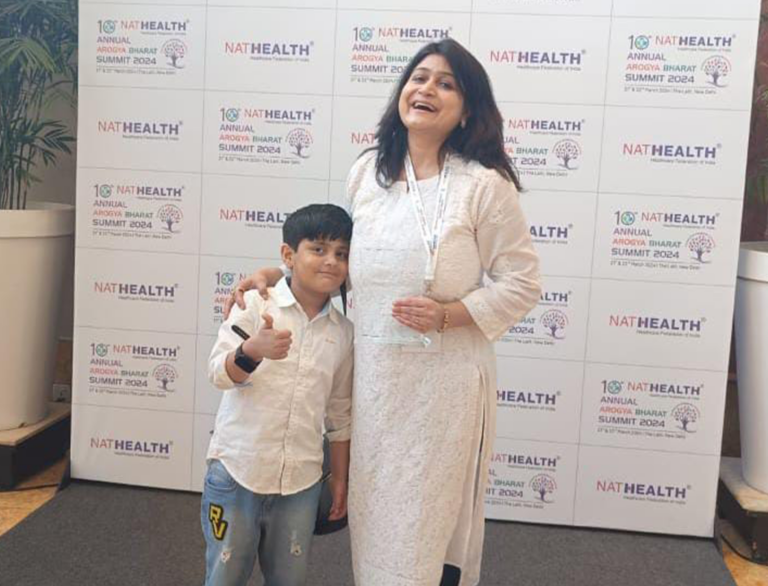Wellness
In A World Where Little Is Known Of Women’s Bodies, Pooja Goswami’s RAMJA Genosensor Is Revolutionary

The technology behind the RAMJA Genosensor relies on an electrochemical DNA biosensor that uses a redox reaction on a screen-printed electrode to identify specific bacterial genes. Thanks to advanced microfabrication technology, this device can extract and analyze DNA from just a small sample—whether it’s blood, urine, or another biological fluid. By quickly identifying infection-causing bacteria and detecting superbug resistance, the RAMJA Genosensor aims to cut down on delayed diagnoses, lower healthcare costs, and ultimately improve patient outcomes.
The RAMJA Genosensor is also shaking up the way we detect microbial infections and antimicrobial resistance with its quick, affordable, and easy-to-use technology. This cutting-edge paper-based device can deliver results in just under two hours with an accuracy rate of almost 99%. Unlike many other tests, it is both economical and user-friendly, almost like a game-changer in the field.
But first: What really is microbial infection and antimicrobial resistance?
Simply put: Microbial infections are caused by tiny organisms like bacteria, viruses, fungi, or parasites that invade the body, disrupt its normal functions, and multiply. These infections range from common colds and mild skin infections to serious diseases like pneumonia or tuberculosis.
However, a growing concern in the medical field is antimicrobial resistance (AMR). This occurs when these once-treatable microorganisms evolve and become resistant to the medications designed to kill them. For example, bacteria that were once easily controlled by antibiotics can mutate and survive these drugs, making infections harder to treat. This resistance is often fueled by overuse or misuse of antibiotics, both in humans and animals.
What happens is that infections are a major area of concern in the ICU, where a staggering 60-80% of patients end up with problems like catheter-related bloodstream infections, ventilator-associated pneumonia, or catheter-associated urinary tract infections. Given these high infection rates, every single patient in the ICU gets tested. The stakes are high—just a one-hour delay in treatment can raise the risk of death by up to 16% in critically ill patients. Unfortunately, traditional tests can take 2 to 5 days to provide results, forcing doctors to rely on broad-spectrum antibiotics that aren’t always the best choice. This delay can make the situation worse, highlighting the urgent need for faster and more precise diagnostic tools.
Moreover, a global review by the World Health Organization (WHO) suggests that women could be at a higher risk than men for developing drug-resistant infections. This factor is often overlooked in discussions about the rising threat of antimicrobial resistance. There is also conversation around how women’s biological factors can heighten their risk of antimicrobial-resistant infections, particularly during pregnancy, abortion, and childbirth.
So how does RAMJA Genosensor help here?
Well, let’s see. Despite living in an era where we have more access to information than ever before, it’s surprising how little we know of women’s bodies. Many women still face challenges in getting accurate information about menstrual health, reproductive issues, or even basic anatomy. There are doctors and many in our society alike who still tell women they are overreacting, that their physical or mental anguish is a figment of their imagination when they visit for a check-up.
Our understanding lags behind when it comes to women’s unique health needs, partly because medical research has historically focused more on male subjects. This lack of knowledge can lead to a range of issues, from misdiagnosed conditions to unnecessary health anxieties. In that sense, Pooja Goswami’s RAMJA Genosensor has become truly revolutionary in the field of medical diagnostics with its ability to detect microbial infection and antimicrobial resistance in no time, where ordinarily it can take days to produce results.
Considering how women face a higher risk of antimicrobial-resistant infections, especially during critical moments like pregnancy and childbirth, the RAMJA Genosensor really makes a difference. Its quick and accurate results are a game-changer, offering not just improved patient outcomes and lower healthcare costs but also highlighting the urgent need for better tools and knowledge in women’s health. This technology is a big step toward closing the knowledge gap and making sure women get the informed, effective care they deserve.
Read More From Wellness
Ananya Panday On Being Called ‘Chicken Legs’ and ‘Flat Chest’ In School & Why We Must Talk About It
Isha Jain